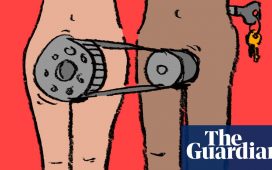I am worried about an old mate. In person, he is gentle and polite and very kind. He is the kind of person who will drop everything to help out his friends – something I know from personal experience. But online he becomes someone else entirely. I have caught him running “egg” accounts on Twitter in which he anonymously annoys and persistently messages both people he knows and doesn’t know – usually people with a public profile – playing “devil’s advocate” on pet issues. He used to be progressive – even politically active on the left – but is now becoming increasingly absorbed into climate crisis denial and related conspiracy theories circulating in those spaces online. He’s always appreciated a good joke, but now he’s harassing people, and it’s impossible to tell which of his personalities is the real one. It’s quite distressing. What can I do?
It’s a very strange feeling to realise you might not know as much of your friend as you thought you did. Especially today, when the cesspool of online communities means your friend could become a fully fledged harasser before you discover it.
You ask what you “can” do, not what you “should” do. The sad truth of the position you find yourself in is that it may be a case where these two things come apart; where the demands of friendship and the demands of morality ask different things of you.
The first thing you can do is ask yourself how to get your friend to own up to the extent of their double life. We are capable of enormous deception, to the people around us but more puzzlingly to ourselves. It may be that your friend has the same relationship to this double life that alcoholics do to the bottle or gamblers to the slot machine, in that he may not see it as abnormal. He may have slid slowly away from the more normal parts of the online behaviour spectrum well into the ultraviolet without realising it.
Small stocktake questions like “How many hours a day do you spend on this?” might help. He likely won’t be able to be candid with you until he can be candid with himself.
The next thing you could do is try to find out what need this is serving for him, which goes otherwise unmet by his offline life. Like any compulsion we retreat into, the internet can act as a salve for wounds that would otherwise demand our attention. It’s annoying to have to pay attention to wounds; it hurts. What is it about his real life that makes life online seem better? Is he unfulfilled; lonely; under occupied? Is he able to crowbar certain sorts of treatment out of people online that he doesn’t usually get?
But this is why I say that the demands of morality and the demands of friendship may come apart for you, and why the position you find yourself in is an especially tricky one. It’s one thing to feel a friend pulling away from your relationship into an anaesthetising bad habit. It’s another when that bad habit hurts other people. Finding out why people do hurtful things behind a veil of anonymity takes patience, kindness, and hours and hours of listening while they cartwheel through stages of denial and self-revelation and maybe – maybe – eventually change. You might not want to provide those things. You’d be well within your rights to decide that this person, this behaviour, does not deserve that patience from you. If you do decide to try to pull your friend back, be patient with the both of you. As the underside of a juice lid I bought once counsels us: the day you plant the seed is not the day you eat the fruit.
*************************************
Ask us a question
Do you have a conflict, crossroads or dilemma you need help with? Eleanor Gordon-Smith will help you think through life’s questions and puzzles, big and small. Questions can be anonymous.
If you’re having trouble using the form, click here. Read terms of service here.














